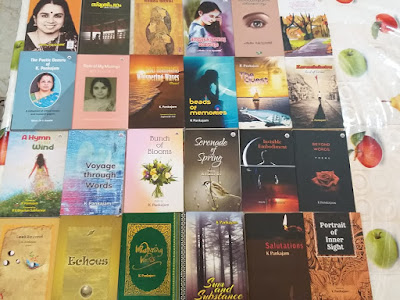Infosys Bangalore, the Indian Multinational information technology company is a brand well known not only in India but allover the world in view of its customer base in Europe, Americas, Asia Pacific, Middle East and Africa. It is a highly sought after destination by freshers not only because of the brand but also for the world class training given to the new recruits at its 350 acre facility in Mysore. It is a place where young freshers come with dreams in their eyes, undergo arduous training requiring long hours of work, grueling work schedules, tests and project work. They need to pass the final examination to be accepted as a regular employee of the company.
This then is the setting for Padmini Chilappagari's E Book "Timeless Treasures" that featured in the Blogchatter E Book Carnival. The protagonist Priya from Hyderabad arrives at the campus for training. She feels secure by the fact that two of her close friends from college Myra and Arjun are also with her during the journey. The book takes you on an interesting trip to all the favourite places of Priya inside the campus, which is known to be an architectural marvel.
It also shares the pressures, joy and fun in the life of trainees for a limited period of a over six months of training As a person with a corporate background who started his career as a management trainee at VISL Bhadravati and as one who headed the learning and development department in Hyundai monitoring the training journey of new recruits, I can relate to the excitement and challenges discussed in the book.
I have visited the Mysore campus of Infosys once when I was heading HR In BEML Ltd Mysore . We had gone straight to the venue of our discussion.On the way, we could see young people playing basket ball and other games and the general beauty of a huge campus. We were curious to know about the other structures in the campus and hoped to come back on some other occasion to explore the campus in more detail. However, this never happened and I moved out of Mysore. "Timeless Treasures" fills up this gap for me giving details of the various food courts (Arena, Magna, Fiesta, Oasis, among others), the dome shaped Multiplex, hostels, amphitheatre, swimming pool, Gym and bowling alleys.
The book also manages to squeeze in a little bit of romance into the narration and the feelings of the characters involved. I enjoyed reading the chapter " Night strolls and new friends" in which Priya meets other college mates Anusha and Rishi (whom she had never met while in college) and agrees to go on a stroll of the campus late in the night after supper. As they discuss of old college times, and move around the sprawling campus, time flies and before they know it, it is 3.30 AM.
The book also discusses their get away to Chamundi Hills, Coorg and trek to Scandagiri Hills near Bangalore after grueling work schedules/project, involving work of 12 to 14 hours. In the chapter "Treading on thin ice". Priya feels home sick after staying away from family for four months. She gives in to this sudden impulse to travel to Hyderabad during the weekend just before an important/ tough test on Monday. Such indulgences and dare devilry is possible only when you are young and have not yet lost the 'care free' approach to life.
The charm of the book is its authenticity. It is written by one who has experienced it all first hand. The author has used a lot of dialogues which adds to the natural flow and appeal of the narration. Little incidents such as feelings of crush that a student feels for her young teacher is narrated, with insight into human nature in these lines:
" I was suddenly thrown off by his smile.It was as if his whole face lighted up with his smile.I suddenly became conscious of my disoriented hair.We had jogged all the way to the class and my hair sure looked stupid.I could do nothing about it."
Although the trainees spent a little over six months at the campus for the training, it is very clear from Priya's narration that many of them got emotionally attached to the place, they had difficulty in bidding adieu. As Priya says " The Infosys management was clever in not disclosing our posting locations till the last minute.This kept us all occupied thinking of our posting locations rather than the thoughts of missing the campus." She adds " We all looked at the campus gates for one last time. But in my case, I couldn't get myself to look at it . If I looked at it another time, I would never be able to leave it."
" Timeless Treasures" is a pleasure to read. It touches a chord at places in your mind and body. Yes, there are grammatical pebbles here and there in this feast of a read. But nothing that a third eye (to borrow the word of critic and fellow blogger Yamimi Maclean) cannot address. The strength of the book is its material, the natural/ authentic language of the characters and an interesting setting.
I wish the young author who has a natural flair for writing the very best!
The book can be downloaded for free Here
I also participated in the # Blogchatter Carnival 2021














